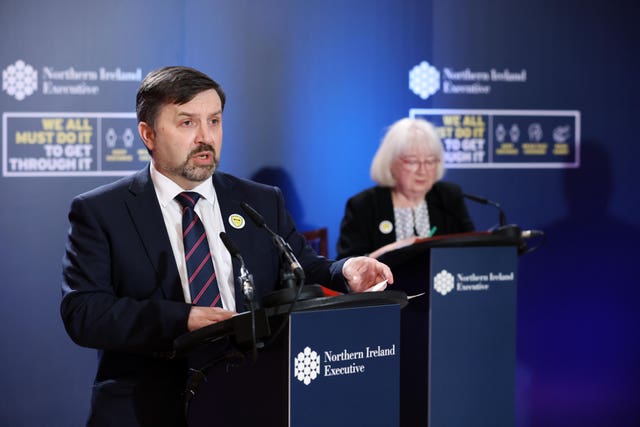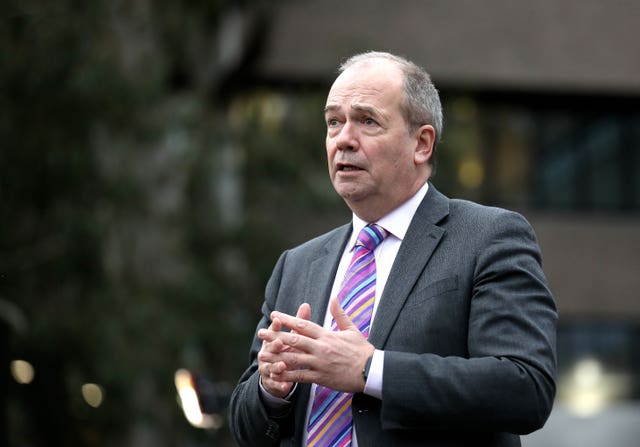Stormont’s Health Minister has warned not to “jump the gun” and abandon lockdown in Northern Ireland too soon.
Robin Swann defended the gradual, step-by-step and cautious approach adopted by ministers and said Ireland and other parts of the UK had taken similar actions.
Some schoolchildren are due to return to classes next month but DUP leader and First Minister Arlene Foster has said the decision should be revisited.
LATEST #COVID19 VACCINE UPDATE FOR NI: https://t.co/3JwqDMVyjO pic.twitter.com/vMM7TPStoG
— Department of Health (@healthdpt) February 24, 2021
All students are to return to school in England on March 8.
Mr Swann said: “The gradual, step-by-step approach agreed collectively by the Executive was the correct one.
“Let’s remember what’s at stake here.
“We must not jump the gun.
“We must not stumble when we can see a finishing line in the distance.”
He said he did not want to be back in the spring or early summer, commenting on another Covid surge, on hospitals filling up, on staff being exhausted and in despair.
“I don’t want to have to propose yet further restrictions.”

Last Thursday, ministers unanimously backed a plan to bring some primary school children back on March 8, with some secondary school children returning to class two weeks later.
Recently Mrs Foster said she wanted to revisit that schedule following the decision to send all students back in England next month.
Mr Swann said: “We should not apologise for taking our own decisions.
“Otherwise, what’s the point in devolution?”
He said there was always a danger, when there were discussions around the easing of restrictions, that some people would jump to the conclusion that the danger had passed, that this was over or nearly over.
Chief medical officer Dr Michael McBride said coronavirus was “endemic” and could not be eliminated but nor could people continue to live with the current restrictions indefinitely.
He anticipated renewed pockets of infection in the months ahead.

“It does mean we may see an increase in transmission,” he said.
“It is important that we reflect on our language at this point in time.
“People are very tired and fatigued, restrictions have taken a huge toll on people’s lives and people’s mental health and well-being.
“The population needs to believe that there is hope.
“That needs to be tempered with realism, that we will be living with this virus for many, many years to come.”
A further two Covid-19 deaths were recorded in Northern Ireland on Wednesday.
The Covid-19 vaccination programme has now reached a milestone of over 500,000 doses delivered to eligible people in Northern Ireland.
Dr McBride said the future may include taking booster doses as new variants of the vaccine came along.
He added: “As treatments get more effective this, in the hopefully not too distant future, will be more like how we live each year with respiratory viruses.”
Mr Swann said the pandemic had taught us that we needed to care for our health service much better.
“It was already in a bad way, well before the ravages of the past 12 months,” he said.
“Getting it back up and running properly – with the Covid threat still lurking – will be a long-term undertaking. There will be no overnight or easy fixes.”
He said the task was made considerably more difficult in the context of yet another single-year and badly stretched budget.
“We have appalling waiting lists and well-documented pressures in social care and mental health,” he said.
“The past year has rightly been described as the biggest challenge of our lifetimes.
“There is another one waiting for us – rebuilding our health service, our economy and our society, and making them better for all our citizens.”




Comments: Our rules
We want our comments to be a lively and valuable part of our community - a place where readers can debate and engage with the most important local issues. The ability to comment on our stories is a privilege, not a right, however, and that privilege may be withdrawn if it is abused or misused.
Please report any comments that break our rules.
Read the rules here